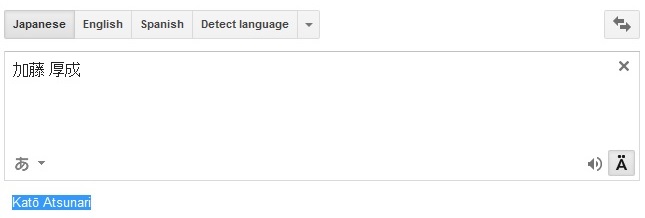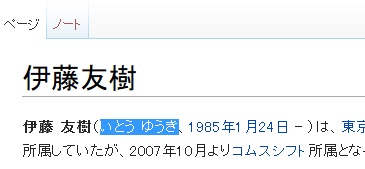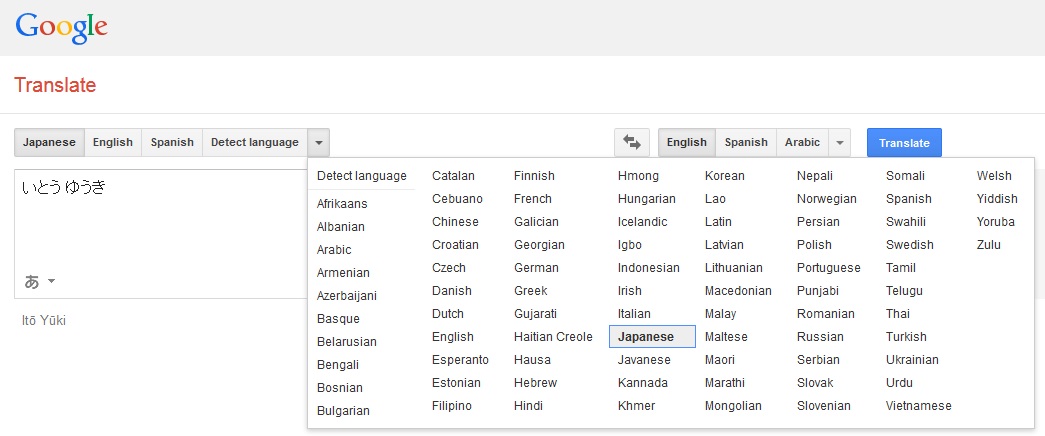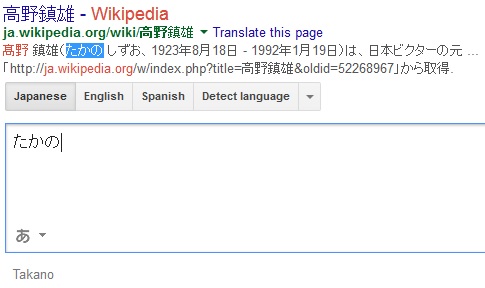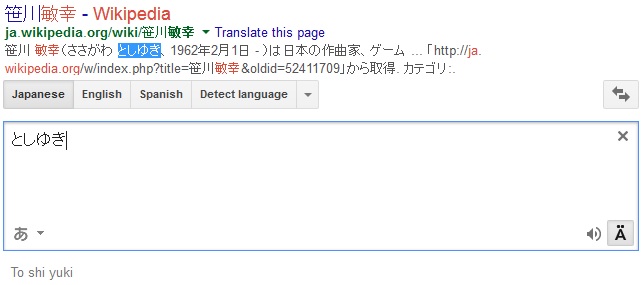Translating Japanese Names: Difference between revisions
mNo edit summary |
|||
| (10 intermediate revisions by the same user not shown) | |||
| Line 1: | Line 1: | ||
When writing for the wiki, you might be interested in translating actors and actresses' names to '' | When writing for the wiki, you might be interested in translating actors and actresses' names to ''romaji''. This article serves as a guide on how to do so, even if you cannot read Japanese. | ||
Sometimes, Google Translate translates it wrongly as ''kanji'' characters can have many different pronounciations. That's why a number of steps is required to prevent a wrong translation. | Sometimes, Google Translate translates it wrongly as ''kanji'' characters can have many different pronounciations. That's why a number of steps is required to prevent a wrong translation. | ||
[[File:Translating japanese names wrong translation.jpg|frame|left|加藤 厚成 is actually pronounced as Katou Kousei. Therefore directly translating the ''kanji'' in Google Translate is not totally reliable.]]<br clear=all> | |||
==Step 1: Finding Their Japanese Wiki Article== | ==Step 1: Finding Their Japanese Wiki Article== | ||
| Line 9: | Line 11: | ||
Make sure that the article you're clicking on is the correct one. You can make sure of that by looking at the link. It must be '''ja.wikipedia.org/wiki/''' followed by their '''exact name''', nothing else, as one different character would mean a different person. So check carefully. | Make sure that the article you're clicking on is the correct one. You can make sure of that by looking at the link. It must be '''ja.wikipedia.org/wiki/''' followed by their '''exact name''', nothing else, as one different character would mean a different person. So check carefully. | ||
[[File:Translating japanese names google.jpg]] | [[File:Translating japanese names google.jpg|frame|left]]<br clear=all> | ||
*You only need to do this step if their name is in ''kanji'' (''kanji'' looks more complex than ''hiragana'' and ''katakana''). If you're not sure what ''kanji'' looks like, just do this step anyways. | *You only need to do this step if their name is in ''kanji'' (''kanji'' looks more complex than ''hiragana'' and ''katakana''). If you're not sure what ''kanji'' looks like, just do this step anyways. | ||
*If you can't find their article on Google, then go to this [[Translating Japanese Names#What to do if you can't find their article on Wikipedia|section]]. | *If you can't find their article on Google, then go to this [[Translating Japanese Names#What to do if you can't find their article on Wikipedia|section]]. | ||
==Step | ==Step 2a== | ||
After finding their Wikipedia article, you can scroll down to check their external links. This usually features their blog or official actor profile page, which you can check to find how they wish their names to be spelt in English. | |||
For example, the actor profile page of 陳内 将 (Jinnai Shou read in Japanese) shows that his preferred English name is Jinnai Syo. | |||
[[File:Translating japanese names extra3.jpg|frame|left]]<br clear=all> | |||
If indeed they have an official English name, then you're done here! You may still wish to continue to step 2b onwards just to check if the Japanese pronounciation of their name is similar to it. | |||
If they do not, then you have to continue to Step 2b onwards. | |||
==Step 2b: Copy Their Name In Hiragana== | |||
Highlight their name in ''hiragana''. This is usually easy to find, in brackets beside their ''kanji'' name, right on top of the wiki page. Press Ctrl+C to copy it. | Highlight their name in ''hiragana''. This is usually easy to find, in brackets beside their ''kanji'' name, right on top of the wiki page. Press Ctrl+C to copy it. | ||
*''Hiragana'' only has one pronounciation per character, and it will provide the standard and undisputed pronounciation to their names. | *''Hiragana'' only has one pronounciation per character, and it will provide the standard and undisputed pronounciation to their names. | ||
[[File:Translating japanese names hiragana.jpg]] | [[File:Translating japanese names hiragana.jpg|frame|left]]<br clear=all> | ||
If there are no brackets beside, then it most likely is in ''hiragana''/''katakana'' already. | If there are no brackets beside, then it most likely is in ''hiragana''/''katakana'' already. | ||
==Step 3: Google Translate It!== | ==Step 3: Google Translate It!== | ||
Use [https://translate.google.com/ Google Translate]. | |||
Make sure you select Japanese on the left. Just click the box on the left and press Ctrl+V to paste. | Make sure you select Japanese on the left. Just click the box on the left and press Ctrl+V to paste. | ||
[[File:Translating japanese names google translate.jpg]] | [[File:Translating japanese names google translate.jpg|frame|left]]<br clear=all> | ||
Copy the '' | Copy the ''romaji'' below the box into your wiki article. | ||
[[File:Translating japanese names google translate2.jpg]] | [[File:Translating japanese names google translate2.jpg|frame|left]]<br clear=all> | ||
==Step 4: Fixing The | ==Step 4: Fixing The Romaji To TV-Nihon Standard== | ||
At TV-Nihon, our way of typing '' | At TV-Nihon, our way of typing ''romaji'' is different from Google's. So you will need to change some characters as follow: | ||
*'''ē''' = ee | |||
*'''ī''' = ii | *'''ī''' = ii | ||
*'''Ō''' = Oo (If it is at the beginning of the name, it will be 2 O) | *'''Ō''' = Oo (If it is at the beginning of the name, it will be 2 O) | ||
| Line 41: | Line 57: | ||
*Group the words together / Remove unncessary spacings | *Group the words together / Remove unncessary spacings | ||
Result from our example: ''' | Result from our example: 伊藤 友樹 '''Itō Yūki''' -> '''Itou Yuuki''' | ||
Another example: '''O oishi ken Ichirō''' -> '''Ooishi Kenichirou''' | Another example: 大石 憲一郎 '''O oishi ken Ichirō''' -> '''Ooishi Kenichirou''' | ||
'''Done!''' | '''Done!''' | ||
| Line 50: | Line 66: | ||
Sometimes, the actors aren't well-known enough, and there isn't a Wikipedia article for them. | Sometimes, the actors aren't well-known enough, and there isn't a Wikipedia article for them. | ||
''To | In this example, we will be using '''髙野敏幸''', a not-so-well-known director. Currently, as of writing, no Wikipedia article exists for him. So, how do you find out how to pronounce it? | ||
Start by determining which his surname is. Usually in 4-character names, the first 2 are the surname, and the last 2 are the given name (this is not definite, if you find that you don't get any results, try the first or first 3 characters together to see if they are the surname). | |||
Then search Google for the surname '''髙野''', as well as the given name '''敏幸'''. You can find out how it is pronounced on the Wikipedia page of people with the same surname or given name. | |||
[[File:Translating japanese names extra1.jpg|frame|left]]<br clear=all> | |||
[[File:Translating japanese names extra2.jpg|frame|left]]<br clear=all> | |||
Result: '''Takano To shi yuki''' -> '''Takano Toshiyuki''' | |||
[[Category: Japanese]] | [[Category: Japanese]] | ||
Latest revision as of 05:11, 8 July 2015
When writing for the wiki, you might be interested in translating actors and actresses' names to romaji. This article serves as a guide on how to do so, even if you cannot read Japanese.
Sometimes, Google Translate translates it wrongly as kanji characters can have many different pronounciations. That's why a number of steps is required to prevent a wrong translation.
Step 1: Finding Their Japanese Wiki Article
Search for ja.wikipedia.org + their name in Japanese characters on Google.
- The ja.wikipedia.org ensures that Google will give you the search result to the Japanese Wikipedia. Otherwise, in many cases, it will link you to the Chinese Wikipedia, as Google assumes kanji characters as Chinese by default.
Make sure that the article you're clicking on is the correct one. You can make sure of that by looking at the link. It must be ja.wikipedia.org/wiki/ followed by their exact name, nothing else, as one different character would mean a different person. So check carefully.
- You only need to do this step if their name is in kanji (kanji looks more complex than hiragana and katakana). If you're not sure what kanji looks like, just do this step anyways.
- If you can't find their article on Google, then go to this section.
Step 2a
After finding their Wikipedia article, you can scroll down to check their external links. This usually features their blog or official actor profile page, which you can check to find how they wish their names to be spelt in English.
For example, the actor profile page of 陳内 将 (Jinnai Shou read in Japanese) shows that his preferred English name is Jinnai Syo.
If indeed they have an official English name, then you're done here! You may still wish to continue to step 2b onwards just to check if the Japanese pronounciation of their name is similar to it.
If they do not, then you have to continue to Step 2b onwards.
Step 2b: Copy Their Name In Hiragana
Highlight their name in hiragana. This is usually easy to find, in brackets beside their kanji name, right on top of the wiki page. Press Ctrl+C to copy it.
- Hiragana only has one pronounciation per character, and it will provide the standard and undisputed pronounciation to their names.
If there are no brackets beside, then it most likely is in hiragana/katakana already.
Step 3: Google Translate It!
Use Google Translate.
Make sure you select Japanese on the left. Just click the box on the left and press Ctrl+V to paste.
Copy the romaji below the box into your wiki article.
Step 4: Fixing The Romaji To TV-Nihon Standard
At TV-Nihon, our way of typing romaji is different from Google's. So you will need to change some characters as follow:
- ē = ee
- ī = ii
- Ō = Oo (If it is at the beginning of the name, it will be 2 O)
- ō = ou (If it is in the middle or end of the name, it will be ou)
- ū = uu
- Remove apostrophe (')
- Remove hypens (-)
- Group the words together / Remove unncessary spacings
Result from our example: 伊藤 友樹 Itō Yūki -> Itou Yuuki
Another example: 大石 憲一郎 O oishi ken Ichirō -> Ooishi Kenichirou
Done!
What to do if you can't find their article on Wikipedia
Sometimes, the actors aren't well-known enough, and there isn't a Wikipedia article for them.
In this example, we will be using 髙野敏幸, a not-so-well-known director. Currently, as of writing, no Wikipedia article exists for him. So, how do you find out how to pronounce it?
Start by determining which his surname is. Usually in 4-character names, the first 2 are the surname, and the last 2 are the given name (this is not definite, if you find that you don't get any results, try the first or first 3 characters together to see if they are the surname).
Then search Google for the surname 髙野, as well as the given name 敏幸. You can find out how it is pronounced on the Wikipedia page of people with the same surname or given name.
Result: Takano To shi yuki -> Takano Toshiyuki
